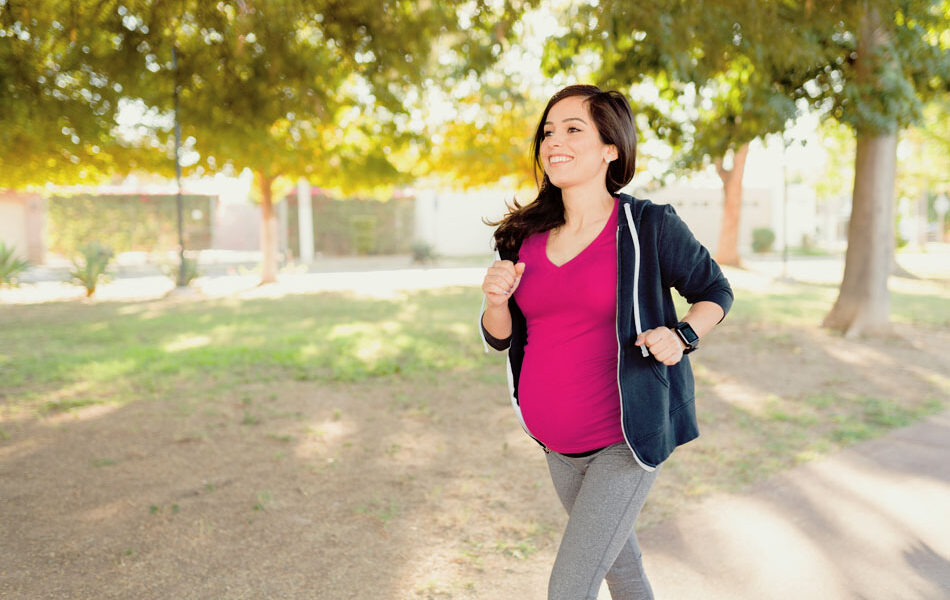Is It Safe to Go Running While Pregnant? 5 Essential Tips
Looking for ways to make your pregnancy experience as smooth as possible? Running might be the answer.

Running has long been an exercise that people of all ages and genders use to prevent heart and lung disease and keep their bodies strong. Anyone who has developed a habitual running practice won’t be quick to give it up, including during their pregnancy.
If you’re a soon-to-be mama, don’t worry. We’re not here to tell you to hang your running shoes up for the next 9 months. Doing regular exercise during pregnancy can help you keep both you and your baby healthy.
But there are certain limitations to keep in mind, especially as you progress further into your pregnancy. Knowing that, keep reading to learn how you can safely continue to run while pregnant.
Is Running While Pregnant Safe?
Yes, and no. During pregnancy, doing moderate-intensity physical exercise, like running, is safe for most pregnant women, especially if they were exercising regularly before getting pregnant.
But women who weren’t running pre-pregnancy might be better suited to finding a lower-impact activity, like swimming or cycling.
Running During Different Trimesters
The challenges you experience while running will change as your pregnancy progresses. During the first trimester, you might struggle with morning sickness, while running during the second and third trimesters might be challenging because of loose joints.
There’s a lot to remember when it comes to creating a running plan that fits the unique needs of your growing body. Whether you need extra accountability or want extra peace of mind knowing that you’re following a plan that fits your personal needs, Joggo can help.

- Personalized running plans created by professional coaches
- Meal plans perfectly tailored to your current diet, allergies, and health needs
- Treadmill mode for people preferring indoor running
- Educational articles on easier running, injury prevention, nutrition, and more
- Behavior science-based reward system for lasting motivation
Running during the first trimester
Often, pregnant women struggle to exercise most during the first trimester. Generally, this is due to nausea and fatigue, which many women experience in the early stages of their pregnancy. Morning sickness can make the idea of going for a run thoroughly unappealing.
That being said, light physical activity, like going for a run, isn’t associated with an increased risk of miscarriage. It’s safe to keep running in the earlier days of your pregnancy if you don’t overexert yourself.
It’s also important to drink enough water before and after your run, as hydration is associated with a more positive pregnancy outcome.
With the rise of progesterone during early pregnancy, don’t be surprised if you feel out of breath, even before you know you’re pregnant.
Running during the second trimester
Many challenges you’ll experience running in the second trimester will be related to your growing belly. Not only will your center of balance be completely different, but you’ll also be doing a high-impact activity with more weight than usual.
During pregnancy, your body is flooded with the hormone relaxin. Levels of this hormone spike somewhere between the 12–14 week mark. Relaxin helps to loosen the pelvic joints to prepare the body for birth, but its effects are also noticed elsewhere in the body.
Because of this, you need to be mindful of your joints and their vulnerability. If you notice pain in your knees or pelvis, it’s time to taper down the length or intensity of your runs. You can also try running on a treadmill to decrease the stress on your joints.
Running during the third trimester
The third trimester is when you’ll experience the biggest change in weight, and because of this, you might start to feel pain in your joints, lower back, or abdomen. Running should be uncomfortable due to the physical challenge, but it should never feel painful.
If you experience any sort of pain, especially in your abdomen, slow down your pace and intensity. You don’t have to stop entirely, but if it’s too uncomfortable, you should switch from running to a different style of walking.
Many women recommend using a belly band to prevent round ligament pain. Other women think using a support belt can keep you from noticing the effects of your workout on your body and belly.
What you decide will ultimately be up to you. At the end of the day, you know your body best.
3 Benefits of Running While Pregnant
Running while pregnant can reduce your risk for pregnancy complications and even help improve your mental well-being.
#1 Prevents gestational diabetes
As many as 10% of pregnant women have a run-in with gestational diabetes (GD) as their pregnancy progresses. Developing GD can put you at risk of cardiovascular disease, more specifically, an increase in blood pressure.
Regular exercise, at least 40 minutes 3 times a week, can reduce your risk of developing gestational diabetes. It’s also a good idea to focus on eating foods to help you manage your blood sugar.
#2 Reduces gestational hypertension
Developing high blood pressure, also known as gestational hypertension, affects mom and baby alike. It can impact the baby’s development in utero and leave the mama at a higher risk for postpartum cardiovascular disease.
Running is an easy solution if you are one of the 10% of mothers suffering from gestational hypertension. Doing moderate-intensity exercise while pregnant can reduce your risk of developing high blood pressure by 30%.
#3 Improves mental health during pregnancy
Regular exercise improves your physical health, reducing the risk likelihood of pregnancy complications and improving your mental health.
Up to 50% of women experience mild depression after birth due to a large drop in pregnancy hormones. As many as 20% of women deal with a more serious form of depression, known as postpartum depression.
Running during pregnancy can improve mental well-being during and after pregnancy and even help new mothers overcome fatigue.
3 Downsides of Running During Pregnancy
Although regular exercise while pregnant can reduce your chances of negative pregnancy symptoms, it also comes with its challenges.
#1 More vulnerable to joint injuries
During pregnancy, your joints become hyperflexible due to an increase in the hormone relaxin. Hyper-flexibility means that the ligaments around your joints loosen and have more stretch, which comes in handy during birth.
While exercising, this extra flexibility can put you at a greater risk of sprains and dislocations. So it’s important to be mindful of your knees and pelvis while you run.
#2 Can put added pressure on the lower back
As your belly grows, your center of gravity changes, and your abdominal muscles also begin to stretch to accommodate the growth.
These changes can place more of a load of running on the low back, causing some pregnant women pain even while sitting. If you experience low back pain while running, it could be time to make changes to your exercise intensity to accommodate your changing body.
#3 More difficult to breathe
Increased demand for oxygen with less room for the diaphragm to expand can cause many women to struggle to breathe deeply.
Struggling to breathe can be uncomfortable while running and pose serious risks to you and your baby. Stop and contact your doctor if you struggle to breathe or feel chest pain.
5 Tips on How to Start Running While Pregnant
Ready to run your way to better health? In this section, we’ll be providing tips on how to get started.
#1 Invest in the right footwear
We’ve talked a lot about how high-impact it can be to run while pregnant. This impact on joints that are already loose and more prone to injury can be a recipe for disaster if you’re not careful.
Investing in a good pair of running shoes with a lot of extra cushion for impact absorption can keep your body injury-free and keep you on your feet for longer.
#2 Eat simple foods pre-workout
If you’re dealing with morning sickness or a generally upset belly, what you eat before running can make a world of difference during your runs.
It’s best to eat complex carbohydrates that won’t upset your stomach. Both oatmeal with berries or whole-grain bread with peanut butter are great options.
#3 Drink lots of water
Since your body is working overtime to care for both mama and baby, it can be at risk of overheating. For this reason, you should never run during the hottest part of the day.
Hydrating properly before and after your run is also important since hydration can directly affect your body temperature.
Using a CamelBak water bottle can help you stay hydrated during your runs. You might also want to pick up a hydration supplement to restore your electrolytes afterward.
A tip from a medical doctor: It is vital to read supplement information or consult your family doctor before using hydration supplements because they may not be suitable for women during pregnancy.
#4 Pre-plan your bathroom breaks
Having to pee more is a regular plight of pregnant women. To prevent an awkward pee situation while you run, it’s a good idea to have pre-planned spots where you can use the bathroom.
Some women choose to run around their homes. This way, they can pop inside for a glass of water and a bathroom break whenever they need.
#5 Run to take care of your body and baby
This might go without saying, but you shouldn’t be trying to beat any of your personal bests while pregnant. It’s a great idea to exercise regularly, but any exercise you do while pregnant should be focused on supporting you and your baby.
Improving your cardiovascular fitness, reducing the likelihood of negative complications, and staying mentally well are all great goals for your pregnancy runs. Take it easy on yourself, and don’t feel bad if you pencil in a few extra rest days.
FAQs
No, running will not shake your baby as it is nicely cushioned by the amniotic fluid surrounding it in the womb.
It isn’t recommended to start running while pregnant, but you can work with a doctor to create a workout plan for you to follow. You always have the option to do easy to moderate-intensity exercise, like going for long walks to start.
Yes, if you have previous running experience and the go-ahead from your doctor, running a marathon will be safe for you and your baby.
Most women stop running sometime in the third trimester simply because it’s no longer comfortable for them to run. That being said, if you experience vaginal bleeding or chest pain, it’s best to hang up your running shoes and talk to a doctor.
A Word From Our Coach
Being pregnant is one of the hardest things you can experience as a woman. You can expect changes in your body due to weight gain, not to mention dealing with morning sickness and fatigue. New mothers have their work cut out for them.
Knowing that, it’s important to be easy on yourself when it comes to exercise. Aim for 90–150 minutes of moderate-intensity weekly exercise, but don’t be upset if you don’t always reach your goal.
What’s important is that you use diet and exercise to help set yourself up for a healthy pregnancy and postpartum experience.
Conclusion
Aerobic exercise during pregnancy can prevent weight gain and some more serious complications like gestational hypertension and postpartum depression.
Even 30 minutes of exercise done three times a week can greatly improve your experience during and post-pregnancy.

- Personalized running plans created by professional coaches
- Meal plans perfectly tailored to your current diet, allergies, and health needs
- Treadmill mode for people preferring indoor running
- Educational articles on easier running, injury prevention, nutrition, and more
- Behavior science-based reward system for lasting motivation

















































 Select your language:
Select your language: 








